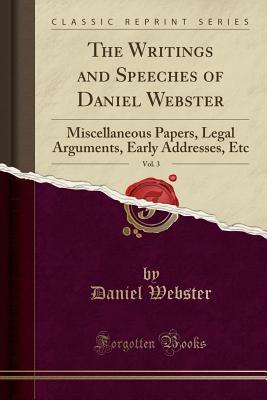The Writings and Speeches of Daniel Webster, Vol. 3: Miscellaneous Papers, Legal Arguments, Early Addresses, Etc (Classic Reprint)
by Daniel Webster
Excerpt from The Writings and Speeches of Daniel Webster, Vol. 3: Miscellaneous Papers, Legal Arguments, Early Addresses, Etc
The foregoing is the title of a book recently published in England, for the purpose of showing the necessity of further and greater retrenchments in the expenses of government, and probably not without some design of spreading the opinion that a change of ministers would be the measure most likely to pro duce the desired effect. It is evidently the work of some of the members or adherents of the Opposition, and some of its statements rest on the authority of the newspapers. But the great mass of its detail is professedly collected from authentic sources, and the account, in general, is probably accurate.
About the Publisher
Forgotten Books publishes hundreds of thousands of rare and classic books. Find more at www.forgottenbooks.comwww.forgottenbooks.com
This book is a reproduction of an important historical work. Forgotten Books uses state-of-the-art technology to digitally reconstruct the work, preserving the original format whilst repairing imperfections present in the aged copy. In rare cases, an imperfection in the original, such as a blemish or missing page, may be replicated in our edition. We do, however, repair the vast majority of imperfections successfully; any imperfections that remain are intentionally left to preserve the state of such historical works.
The foregoing is the title of a book recently published in England, for the purpose of showing the necessity of further and greater retrenchments in the expenses of government, and probably not without some design of spreading the opinion that a change of ministers would be the measure most likely to pro duce the desired effect. It is evidently the work of some of the members or adherents of the Opposition, and some of its statements rest on the authority of the newspapers. But the great mass of its detail is professedly collected from authentic sources, and the account, in general, is probably accurate.
About the Publisher
Forgotten Books publishes hundreds of thousands of rare and classic books. Find more at www.forgottenbooks.comwww.forgottenbooks.com
This book is a reproduction of an important historical work. Forgotten Books uses state-of-the-art technology to digitally reconstruct the work, preserving the original format whilst repairing imperfections present in the aged copy. In rare cases, an imperfection in the original, such as a blemish or missing page, may be replicated in our edition. We do, however, repair the vast majority of imperfections successfully; any imperfections that remain are intentionally left to preserve the state of such historical works.
BUY NOW
Paperback, 658 pages
Published May 1st 2018 by Forgotten Books
© 2025 Bibleportal.com 版权所有.

Daniel Webster was a leading American statesman during the nation's Antebellum Period. He first rose to regional prominence through his defense of New England shipping interests. His increasingly nationalistic views and the effectiveness with which he articulated them led Webster to become one of the most famous orators and influential Whig leaders of the Second Party System.
Daniel Webster was an attorney, and served as legal counsel in several cases that established important constitutional precedents that bolstered the authority of the Federal government. As Secretary of State, he negotiated the Webster-Ashburton Treaty that established the definitive eastern border between the United States and Canada.
Webster tried three times to achieve the Presidency; all three bids failed, the final one in part because of his compromises. Similarly, Webster's efforts to steer the nation away from civil war toward a definite peace ultimately proved futile. Despite this, Webster came to be esteemed for these efforts and was officially named by the U.S. Senate in 1957 as one of its five most outstanding members.
... Show more